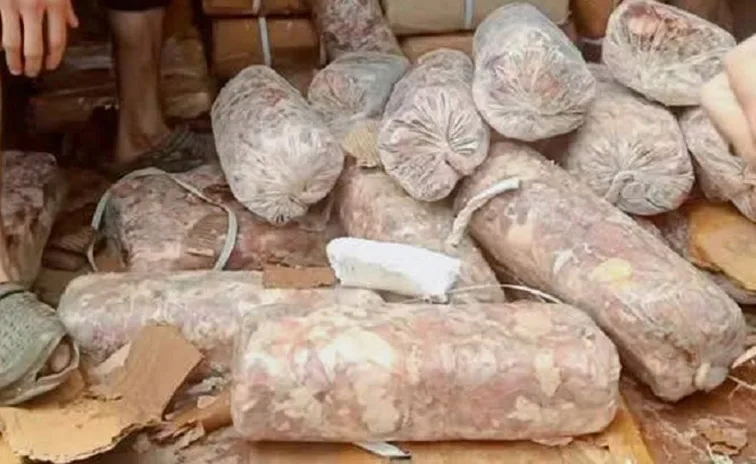Srinagar, Aug 21: The Jammu and Kashmir government has issued a stern warning to meat sellers, cold storage operators, and e-commerce platforms against selling frozen meat and poultry without proper labelling or storage. The Food & Drug Administration (FDA), under the Drugs & Food Control Organisation, has announced that violators will face strict penalties, including fines, stock seizure, and even imprisonment under the Food Safety and Standards Act (FSSA), 2006.In a public notice issued, the department directed all Food Business Operators (FBOs)—including manufacturers, processors, transporters, retailers, wholesalers, and online platforms—to strictly comply with the FSSA and the Food Safety and Standards (Packaging and Labelling) Regulations, 2020.The directive, officials said, aims to safeguard public health and ensure the highest standards of food safety in handling, storage, distribution, and sale of frozen raw meat, chicken, and related products.The notice clarified definitions of fresh, chilled, and frozen meat. Fresh meat is sold soon after slaughter without preservation; chilled meat is kept between 0°C and 4°C for short-term shelf life; and frozen meat is preserved at –18°C or lower for long-term storage and transport.Frozen meat and related products must remain at –18°C or below throughout production to sale, while chilled storage at 4°C is permissible only for two to four days. Products stored at –18°C or below should be consumed within 12 months of freezing.All establishments have been directed to install calibrated temperature monitoring devices and maintain accurate records for inspections.As per the labeling regulations, every frozen meat or chicken package must display the product name, complete list of ingredients, non-vegetarian declaration with the prescribed symbol, net quantity, batch or lot number, date of manufacture/packing, expiry or use-by date, storage conditions, and the manufacturer or importer’s complete address, along with the FSSAI license number and logo.For e-commerce platforms, the shelf life at delivery must be at least 30% of the total shelf life or 45 days before expiry, whichever is earlier. Mandatory information must be made available to consumers before purchase, and product images must be displayed online.Packaging materials must be food-grade, safe, non-toxic, and compliant with FSSAI standards. Products labelled as Halal Certified must also meet all FSSAI safety, hygiene, and labelling norms.The department warned that non-compliance would invite strict enforcement, including seizure of stock and heavy monetary penalties—up to Rs 5 lakh for sub-standard products, Rs 3 lakh for misbranding or missing labels, Rs 1 lakh for insanitary conditions, Rs 2 lakh for selling without FSSAI registration, and Rs 10 lakh for operating without an FSSAI license. Offences involving unsafe food can lead to imprisonment of up to six years and a fine of up to Rs 5 lakh.The FDA has directed all FBOs to review and upgrade their operations, ensure full compliance, maintain updated records, and delist any non-compliant products from outlets and online platforms. It warned that failure to comply will result in swift legal action without further notice.On August 20, the High Court of J&K and Ladakh issued notice to the J&K government for its response to a PIL seeking judicial intervention to prevent the sale, storage, distribution, and transportation of rotten, unhygienic, and unsafe meat, poultry, and fish products in J&K.The Food Safety Department officials said they have sent food samples, including meat, chicken, and other contaminated food items, to Food Safety and Standards Authority of India (FSSAI) laboratory in Ghaziabad for advanced testing; however, the reports are awaited.The move followed a crackdown on the sale of rotten and substandard food items, including chicken, meat, kebabs, rista, and goshtaba across Kashmir and Jammu as well.
J&K govt warns meat sellers, e-commerce platforms to comply with food safety rules
Mislabelling, poor storage to attract heavy penalties including imprisonment

Sign Up For Daily Newsletter
Be keep up! Get the latest breaking news delivered straight to your inbox.
By signing up, you agree to our Terms of Use and acknowledge the data practices in our Privacy Policy. You may unsubscribe at any time.
Leave a Comment Leave a Comment
Stay Connected
Latest News
Recent Posts
- ‘Govt committed to protecting purity, sanctity of Pashmina’
- Authorities conduct market checking drive in Handwara, 3 FIRs registered
- Licences of 3 restaurants suspended in Kangan after unsafe lab results
- Badipathri Thune villagers seek health sub-center, Aanganwadi, and Sumo service facilities.
- Actor Raza Murad praises Sonamarg’s scenic beauty







